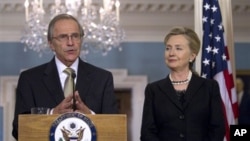The United States says Sudan’s seizure of much of the disputed Abyei region jeopardizes the country’s north-south peace accord and complicates efforts at normalizing U.S.-Sudan relations. The U.S. Special Envoy for Sudan is making a crisis visit to the country this week.
The State Department is condemning the May 19 attack on Sudanese troops by southern forces that apparently triggered the latest crisis.
But it says the response by the Khartoum government - seizing much of the disputed Abyei region including the town of Abyei - was “extremely disproportionate” and threatens the country’s north-south peace accord, as well as the normalization of U.S. ties with Khartoum.
The status of oil-rich Abyei has been the main outstanding issue in the implementation of the country’s 2005 north-south peace process, which is due to culminate July 9th with independence for the southern Sudan.
U.S. Special Envoy for Sudan Princeton Lyman told reporters the Sudanese military move is a “very serious violation” of the country’s Comprehensive Peace Accord, known as the CPA. He said urgent action by Sudanese President Omar el-Bashir and southern leader Salva Kiir is needed to put the process back on track.
“We think those forces should be withdrawn," said Lyman. "The civilian administration which President Bashir unilaterally dissolved should be recreated. And we have urged that President Bashir and Vice President Kiir, who is head of the southern Sudan administration, immediately come together and calm the situation down, and restore the level of cooperation they talked about after the January 9th referendum.”
The envoy said the Abyei crisis has prompted intensive U.S. diplomacy, including calls to Sudanese Vice President Ali Osman Taha and Salva Kiir by Secretary of State Hillary Clinton. Lyman said he will leave for Sudan later this week for his second visit there this month.
He said the process of fully normalizing U.S. relations with the Khartoum government, which the Obama administration has held out as a reward for CPA implementation, cannot go forward under current circumstances.
“We had started the process, as you know, of looking at how to take them off the list of state sponsors of terrorism," he said. "We have been working with the World Bank and others on the debt situation. We have been looking at the prospect of naming a full ambassador after July 9th in Khartoum. All of these are important steps in normalization. They cannot be fulfilled if we do not have a successful CPA.”
U.S. Senate Foreign Relations Committee Chairman John Kerry warned that Sudan is now, in his words, “ominously close to the precipice of war.
His concerns about wider fighting are shared by Sudan expert Jon Temin of the United States Institute of Peace, who said the longer the Abyei issue remains unresolved, the greater the potential for violence.
“It is clearly a significant setback," he said. "And it comes just a few weeks before southern Sudanese secession is scheduled to happen on July 9. And it really draws into question whether the remaining weeks before that secession happens is going to be peaceful and whether the parties are going to be able to make progress on the very critical negotiations concerning how they are going to split and the details of that split and what is going to happen to Abiyeh after they split.”
Temin said there is a limit to what condemnation and prodding by the United States and others can achieve, and that the Sudanese parties have to decide if they want a resolution. He said at the moment, it does not appear that they do.
US: Sudan Peace Deal in Jeopardy After Abyei Seizure




